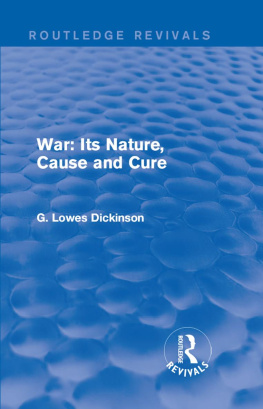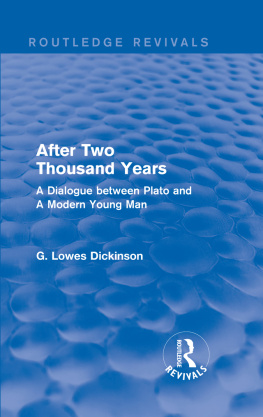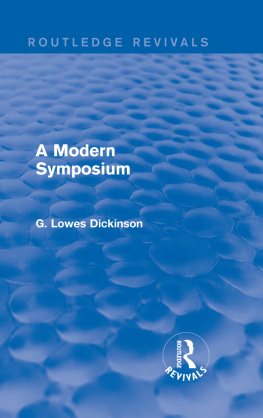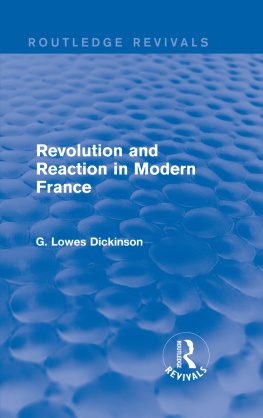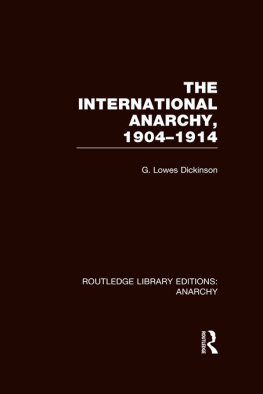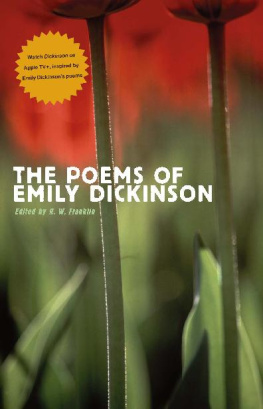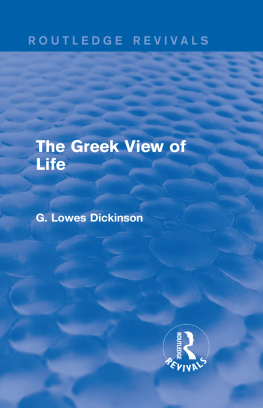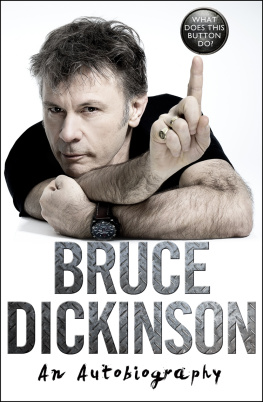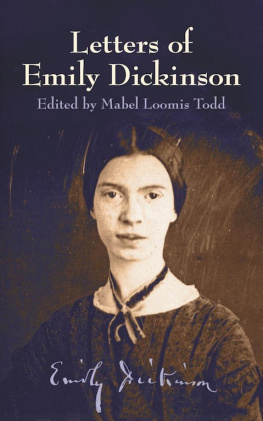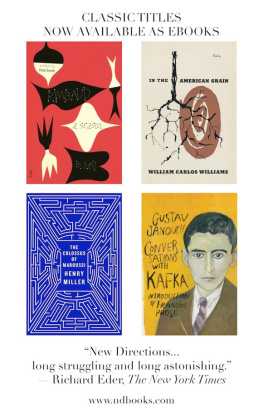Routledge Revivals
War: Its Nature, Cause and Cure
First published in 1923, this book examines the causes and evils of War. Being published soon after the First World War, this becomes the basis for much of the volumes experience. The author G. Lowes Dickinson argues that war and civilisation are incompatible and that the pursuit of war will end in the destruction of mankind.
War: Its Nature, Cause and Cure
G. Lowes Dickinson
First published in 1923
by George Allen & Unwin LTD
This edition first published in 2016 by Routledge
2 Park Square, Milton Park, Abingdon, Oxon, OX14 4RN
and by Routledge
711 Third Avenue, New York, NY 10017
Routledge is an imprint of the Taylor & Francis Group, an informa business
1923 George Allen & Unwin LTD
The right of G. Lowes Dickinson to be identified as author of this work has been asserted by him in accordance with sections 77 and 78 of the Copyright, Designs and Patents Act 1988.
All rights reserved. No part of this book may be reprinted or reproduced or utilised in any form or by any electronic, mechanical, or other means, now known or hereafter invented, including photocopying and recording, or in any information storage or retrieval system, without permission in writing from the publishers.
Publishers Note
The publisher has gone to great lengths to ensure the quality of this reprint but points out that some imperfections in the original copies may be apparent.
Disclaimer
The publisher has made every effort to trace copyright holders and welcomes correspondence from those they have been unable to contact.
ISBN 13: 978-1-138-95872-2 (hbk)
ISBN 13: 978-1-315-66108-7 (ebk)
WAR: ITS NATURE, CAUSE AND CURE
BY
G. LOWES DICKINSON
Author of A Modern Symposium, The Letters of John Chinaman The European Anarchy etc., etc.
First published May .. 1923
Reprinted .. September 1923
(6th Thousand) July .. 1925
Printed in Great Britain by
UNWIN BROTHERS, LIMITED, LONDON AND WOKING
(All rights reserved)
IF an author could choose his audience, I would choose that the following pages should be read by men, and especially young men, who have served in the Army and Navy. To those who already see and feel the menace of modern war, and understand its causes, I have nothing new to say. To militarists, who neither see nor feel, it is idle to speak. But the country is full of young men who are open to the truth, if they had the leisure, the opportunity and the desire to seek it. And to them, in the hope that this book may fall into their hands, I am writing this word of preface. Some of them, perhaps many of them, will have found in war something which they prize and prize rightly. The following passages give some expression to it. A young officer writes to me in a private letter:
I should not stress too much the horror of war to those who actually took part in it. I know my experiences were with an exceptionally united and successful body of men, and that to many the war was plain hell. But there was, to many of us, very much on the other side. Nor was this a joy in the actual fighting, nor a fascination with tawdry romance. There were greater things. You may say we were spiritually drugged and pathetically deluded. But never before or since have we found them. There was an exaltation, in those days of comradeship and dedication, that would have come to few in other ways. And so, to those of us who have ridden with Don Quixote and Rupert Brooke on either hand, the Line is sacred ground, for there we saw the vision splendid.
The other passage is from an unpublished diary and reads as follows:
I had in this company a sense of union, of identity, of complete at-oneness and a strength of pure affection which I have never felt for anyone else. Really, I loved without mawkishness or sentimentality and untouched by any feeling of sex or inspiration of an ulterior motive. It seemed a natural love welling up from the heart, because it must, like the love that is supposed to exist between a mother and son, and a sister and brother. It was a spontaneous emotion, an active state unconnected with personal attributes but existing between us because I was I and they were they. It was a personal devotion ideally expressed by greater love hath no man than this, that he lay down his life for another. I think that is one of the good points of war, that it makes you true to others and go outside yourself where he who stands alone is lost. I suppose that is as good for character as the Army is bad. The form has spoilt the spirit, like the difference between Christs word and what the Churches have made out of it.
I leave these words without comment. They are the record of genuine experience which it is no part of my case to belittle or deny. But the writers, I know, would not suppose that such experiences justify war. They are only something to be set against its evils. What those evils are, and will be, I have tried to set forth here. And also, which may weigh more with some minds, I have shown what the causes of war really are. It is, to my mind, no exaggeration, but a plain truth, that war and civilisation henceforth are incompatible. I would myself go further. I think that the very existence of mankind is incompatible with that further development of methods of destruction on which science is actually engaged. Yet I see little evidence that this truth is grasped by most men or women. No subject is more unpopular, to think or talk about, than war. And the soldiers and diplomats, while their peoples attend to other things, are renewing the whole apparatus of policy which led to the last and must lead to the next catastrophe. I do not see how this is to be met, except by ordinary men and women giving their minds to the real facts. And among those, one would suppose, the most active should be those who know by experience what modern war is like. I will conclude by a passage from a book I cite more than once in what follows, Mr. C. E. Montagues Disenchantment:
There is only one thing for it. There must still be five or six million ex-soldiers. They are the most determined peace-party that ever existed in Britain. Let them clap the only darbies they havethe Covenant of the League of Nationson to the wrists of all future poets, romancers and sages. We must beware in good time of those boys and elderly fiery men piping in Thessaly.
CONTENTS
WAR: ITS NATURE, CAUSE AND CURE
MY theme may be put in a sentence:If mankind does not end war, war will end mankind. This has not been true in the past. But it is true in the present. For the present has produced something new. It has produced science. And if science is the principal hope of mankind, it is also the principal menace. For it can destroy as easily as it can create; and all that it creates is useless, if it creates only to destroy. But destruction is what war means; and all its other meanings are made meaningless by this.
Let me illustrate. On this day, March 22, 1922, I read in my newspaper a discussion in the House of Commons on the Aircraft Force. A member (says the account) drew attention to the probable horrors of the next war. Vast fleets of aeroplanes would come over our towns with bombs of 4,000 or 5,000 pounds containing high explosives, poison gas, and probably cholera germs, and the women and children in those towns would suffer as much as the men engaged in actual warfare. Or take another statement, by Major-General Seeley, ex-Minister of War: Chemical knowledge was now so far advanced that, with very little trouble and at very moderate cost, a hundred thousand people could be blotted out by lethal gas during an air raid. A great deal of nonsense had been spoken about wonderful discoveries. The truth was that the manufacture of the most deadly gases was easy and inexpensive. It was simple and horrible. The choice was really between disarmament and extermination.



